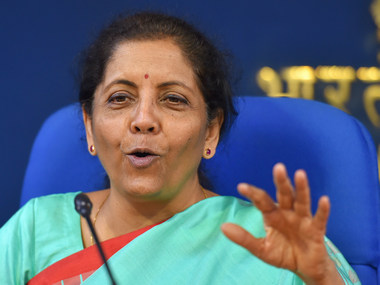Union Finance Minister Nirmala Sitharaman has her tasks cut for the Indian banking sector in the Union Budget 2020. The Budget is an opportunity for the finance minister to address some of the long-pending critical issues, beginning with addressing the massive capital requirement for the banks. These entities, hit by massive provisioning requirement for bad loans in the aftermath of the clean-up exercise, will require a substantial amount of fresh capital infusion to generate growth capital to resume lending to productive sectors once demand picks up, analysts said. “There is not enough credit demand at the moment. But, that may not be the case next year when growth begins to picks up. Banks need to be funded well to resume lending to industries,” said an analyst with a leading brokerage in Mumbai. [caption id=“attachment_7679911” align=“alignleft” width=“380”] File image of Union Finance Minister Nirmala Sitharaman. PTI[/caption] Capital infusion Since coming to power in 2014, the Narendra Modi-government has pumped in around Rs 2.8 lakh crore in the state-run banks. This fiscal year, the government infused close to Rs 70,000 crore capital in the public sector banks (PSBs). But, that was inadequate considering the fact that the banks required a substantial chunk of money to clean up their bad loans besides meeting their Basel-III requirements. Recently, news agency PTI had reported that the government was unlikely to announce capital infusion for the PSBs in the upcoming Budget. Instead, the government wants banks to expedite recovery of bad loans and raise funds from the market. Besides, the government also wants banks to sell their non-core assets and generate money. In a normal scenario, these suggestions make sense. But, the state of Indian banking sector is far from normal. There won’t be too many takers for stare-run banks in the market, except for the likes of State Bank of India (SBI). The gross non-performing asset (NPA) levels of the banks have slightly eased from the peak levels but still constitute about 9.3 percent of the total loans. A report of the Reserve Bank of India (RBI) report recently said that the gross NPA levels could touch 9.9 percent by September this year. In simple words, this means that the banks will require more capital this year to make provisions. The Budget needs to address this part. Privatisation, not merger The Modi-government has been averse to the idea of privatising state-run banks. Instead, it has only resorted to merging smaller and weaker banks with bigger ones. But experts have long argued that merger of weak banks will not solve the problem of governance issues and lack of autonomy. Besides, merging a weak bank with a strong bank could even impact the health of the big bank. The only major bank acquisition that happened in the recent past is the LIC-IDBI Bank deal. But, this cannot be termed as a case of privatisation since the LIC is a government-owned entity. In a highly competitive market scenario, a fiscally constrained government cannot continue with the ownership of state-run banks. It will have to look at options to gradually cede ownership control in some of the PSBs. Sitharaman could use her Budget speech to lay out a roadmap for the privatisation of the PSBs. Better risk management The government should also look at the loopholes in the risk-management systems in the PSBs. The state-run banks continue to have weak risk management tools and are exposed to frauds. A series of frauds at banks like Punjab National Bank (PNB) and Punjab and Maharashtra Co-operative (PMC) Bank have shaken the confidence of customers in the banking institutions. The RBI has initiated steps to ringfence banking system from fraudsters such as revising the rules for co-operative banks. But, the government will have to bring in legislation to overhaul the governance structure of the co-operative banking sector more effectively. It should also take steps to significantly increase the limit of deposit insurance scheme, which is just Rs 1 lakh per depositor at the moment. In the event of a bank failure, this will prove to be severely inadequate. The insurance cover needs to be upped to give protection to all depositors. Follow full coverage of Union Budget 2020-21 here
In a normal scenario, these suggestions make sense. But, the state of Indian banking sector is far from normal.
Advertisement
End of Article


)

)
)
)
)
)
)
)
)



